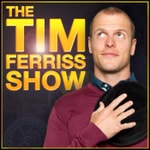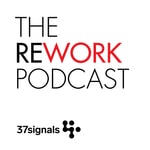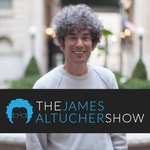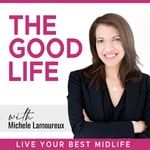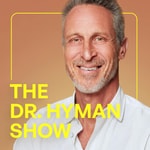Mastering Nutrition – Details, episodes & analysis
Podcast details
Technical and general information from the podcast's RSS feed.
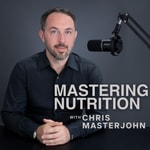
Mastering Nutrition
Chris Masterjohn, PhD
Frequency: 1 episode/4d. Total Eps: 697

Recent rankings
Latest chart positions across Apple Podcasts and Spotify rankings.
Apple Podcasts
🇨🇦 Canada - nutrition
02/08/2025#68🇬🇧 Great Britain - nutrition
02/08/2025#69🇨🇦 Canada - nutrition
31/07/2025#82🇨🇦 Canada - nutrition
19/07/2025#84🇨🇦 Canada - nutrition
12/07/2025#80🇨🇦 Canada - nutrition
08/07/2025#91🇨🇦 Canada - nutrition
07/07/2025#47🇨🇦 Canada - nutrition
06/07/2025#26🇩🇪 Germany - nutrition
05/07/2025#92🇨🇦 Canada - nutrition
03/07/2025#91
Spotify
No recent rankings available
Shared links between episodes and podcasts
Links found in episode descriptions and other podcasts that share them.
See all- https://ouraring.com/
546 shares
- https://chrismasterjohnphd.com/q&a
404 shares
- https://twitter.com/chigrl
31 shares
- https://twitter.com/crossbordercap
25 shares
- https://twitter.com/Josh_Young_1
20 shares
RSS feed quality and score
Technical evaluation of the podcast's RSS feed quality and structure.
See allScore global : 59%
Publication history
Monthly episode publishing history over the past years.
How Lactate Alkalinizes Your Muscles
vendredi 6 septembre 2024 • Duration 01:34:50
For a long time, most people believed that when we exercise, our muscles make lactic acid, this acidifies the muscles, and the acidity contributes to contractile failure, fatigue, and delayed-onset muscle soreness. Some people still believe this.
You may have heard the argument against it from well-known figures like Andy Galpin, or, if you’re deep into the science, you may have read the work of George Brooks.
In this lesson, we are going to cover the biochemistry of lactate production. We will see that we never make lactic acid, ever. We make lactate. Making lactate is fundamentally alkalinizing.
We will take a look at the presentation of glycolysis in the Berg and Lehninger biochemistry textbooks to see that, on the one hand, they give us everything we need to know to understand that the human body never makes lactic acid, but, on the other hand, they really do not equip us well to understand where acidity does comes from during exercise. This is because they do not consider acid-base balance important enough to completely present the proton balances of the chemical reactions.
Finally, we will cover what does cause muscular fatigue, take a look at the research on lactate supplements, and come to some conclusions about the best way to manage acidity during exercise to maximize performance.
This is part of a larger course on the biochemistry of how we derive energy from food and use it to fuel our wellness, performance, and longevity. Take the full course here:
https://chrismasterjohnphd.substack.com/p/masterclass-with-masterjohn-energy
To see the slides, watch this lesson on youtube:
https://www.youtube.com/watch?v=IrpbLllsSHQ
To obtain the written version with timestamped slides for better studying, see here:
https://chrismasterjohnphd.substack.com/p/how-lactate-alkalinizes-your-muscles
This lesson is free for one week. After that it will be reserved for Masterpass members. You can learn more about the Masterpass here:
https://chrismasterjohnphd.substack.com/about
You can subscribe to the Masterpass here:
https://chrismasterjohnphd.substack.com/subscribe
2:52 How textbooks present glycolysis
3:36 What is acidity?
4:32 The acidfying and alkalinizing phases of glycolysis
7:09 Glycolysis: A brief review
10:08 The Principles
29:33 The Reactions -- and Where the Textbooks Go Wrong
38:59 Human beings do not make lactic acid
42:13 Lactate transport is even more alkalinizing to muscle
47:44 Robert Robergs Fights an Uphill Battle in Clarifying the Sources of Acidity and the Alkalinizing Effect of Lactate
1:01:08 What causes fatigue?
1:05:15 Does CO2 contribute to acidity?
1:13:45 Where is Glycolysis Getting Backed Up?
1:23:10 Conclusiuons: What's realy going on with exercise-induced acidosis.
1:26:34 Lactate supplements
1:30:53 How to use this information in training for optimal performance.
D-Lactate: Groundbreaking Research No One Is Talking About
mercredi 31 juillet 2024 • Duration 01:30:24
D-lactate is commonly stated to be exclusively a microbial metabolite.
This is found in assumptions within the medical literature for decades even when it was long-known to be false.
While D-lactate is indeed made by bacteria, D-lactate is also inarguably and irrefutably produced by human enzymes.
In this podcast, moreover, I will argue the following:
Microbial contribution to D-lactate in humans under normal circumstances is negligible.
I coin the term “the D-lactate shuttle” to describe a role for D-lactate that should eventually make its way into biochemistry textbooks alongside the malate-aspartate shuttle and the glycerol phosphate shuttle.
The D-lactate shuttle operates alongside these other shuttles to balance the priorities of conserving cytosolic NAD+, reducing cytosolic acidity, bypassing complex I, or generating ATP. It is uniquely useful as a shuttle when there is an absolute deficit of niacin or NAD(H).
D-lactate is an important contributor to gluconeogenesis that could account for up to 11% of it and rival an individual amino acid.
While D-lactate concentrations in human plasma are infinitesimal, when the downstream metabolism of D-lactate and L-lactate are blocked by genetic disorders, the concentrations of the two forms are similar in plasma. This contrasts wildly with the common claim that flux through D-lactate is “minuscule.” Most likely D-lactate is produced in considerable quantities in liver and kidney but is rarely secreted into plasma because doing so would risk neurotoxicity.
D-lactate should be taken seriously for its potential role in Parkinson’s and in neurological problems generally, for its role in diabetes, and for its extremely underappreciated roles in glycolysis, gluconeogenesis, and the respiratory chain.
Oxalate powerfully impairs D-lactate clearance, so D-lactate should be investigated as a potential link between oxalate and autism, and oxalate-lowering strategies should be seen as a way to improve D-lactate clearance and reduce its potential role in diabetes and neurological disorders.
See the sections on riboflavin, zinc manganese, and glutathione in Testing Nutritional Status: The Ultimate Cheat Sheet, as well as Does CoQ10 Deserve a Spot on Your Longevity Plan? and the How to Detox Manganese guide for managing the relevant nutrients.
Read the written version for live links and references:
https://chrismasterjohnphd.substack.com/p/d-lactate-groundbreaking-research
Cancer, IV Drips, and the Glutathione Vitamin C Connection
lundi 6 novembre 2023 • Duration 02:10
Is high-dose vitamin C good for you?
High-dose intravenous vitamin C can selectively kill cancer cells in live patients and can save sepsis patients from dying, but it acts as a pro-oxidant in cancer and an antioxidant in sepsis.
So what does it do in the rest of us?
Oral doses of 2000 milligrams raise oxalate levels in most people, and as little as 400 milligrams raises oxalate in some people.
This seems to be the most sensitive indicator of a delicate imbalance with glutathione and other factors needed to recycle vitamin C. Such a balance actually needs to be avoided when killing cancer yet is critical to maintaining health in every other context.
Given that vitamin C is important to immunity and general health, how do we take advantage of these benefits without upsetting the delicate balance with glutathione and the propensity to generate oxalate?
That is the topic of this podcast.
This podcast is a preview of a video only available to Masterpass members.
Get evergreen access to the video and podcast, as well as the written article with references, here:
https://chrismasterjohnphd.substack.com/p/balancing-vitamin-c-and-glutathione-d6f
Is urinary mycotoxin testing useful for indoor mold exposure? | Masterjohn Q&A Files #290
vendredi 1 octobre 2021 • Duration 08:04
Short Answer: When I had a serious case of indoor mold-induced illness, I tested my urine and my apartment dust for mycotoxins. Both were high, but the classes of toxins were totally different between the two, making me think the mycotoxins in my urine came from food rather than my apartment. Symptoms going away when outside of the apartment was a far more useful clue, so I think you should consider the cost of a vacation, the cost of mycotoxins, and assume you get more information out of taking the vacation, and then decide which to do.
Watch the video or listen to the podcast with the links below. You can obtain a full transcript of the episode by signing up for the Masterpass at https://chrismasterjohnphd.com/q&a
Please consider supporting my work by making a purchase using these links at one of my affiliates: https://chrismasterjohnphd.com/foursigmatic, https://chrismasterjohnphd.com/paleovalley, https://chrismasterjohnphd.com/seekinghealth, https://chrismasterjohnphd.com/ancestralsupplements, https://chrismasterjohnphd.com/magicspoon, https://chrismasterjohnphd.com/lmnt
Plenty more at https://chrismasterjohnphd.com/support!
If you would like to be part of the next live Ask Me Anything About Nutrition, sign up for the CMJ Masterpass, which includes access to these live Zoom sessions, premium features on all my content, and hundreds of dollars of exclusive discounts. You can sign up with a 10% lifetime discount here: https://chrismasterjohnphd.com/q&a
DISCLAIMER: I have a PhD in Nutritional Sciences and my expertise is in performing and evaluating nutritional research. I am not a medical doctor and nothing herein is medical advice.
Access the show notes, transcript, and comments here.
Ferritin sky-high without hemochromatosis? | Masterjohn Q&A Files #289
jeudi 30 septembre 2021 • Duration 11:35
Short Answer: Even if genetics and other bloodwork don’t look like hemochromatosis, sky-high ferritin justifies trying to lower it with blood donation or phlebotomy if inflammation markers are low. If this doesn’t work, oxidative stress should be investigated.
Watch the video or listen to the podcast with the links below. You can obtain a full transcript of the episode by signing up for the Masterpass at https://chrismasterjohnphd.com/q&a
Please consider supporting my work by making a purchase using these links at one of my affiliates: https://chrismasterjohnphd.com/foursigmatic, https://chrismasterjohnphd.com/paleovalley, https://chrismasterjohnphd.com/seekinghealth, https://chrismasterjohnphd.com/ancestralsupplements, https://chrismasterjohnphd.com/magicspoon, https://chrismasterjohnphd.com/lmnt
Plenty more at https://chrismasterjohnphd.com/support!
If you would like to be part of the next live Ask Me Anything About Nutrition, sign up for the CMJ Masterpass, which includes access to these live Zoom sessions, premium features on all my content, and hundreds of dollars of exclusive discounts. You can sign up with a 10% lifetime discount here: https://chrismasterjohnphd.com/q&a
DISCLAIMER: I have a PhD in Nutritional Sciences and my expertise is in performing and evaluating nutritional research. I am not a medical doctor and nothing herein is medical advice.
Access the show notes, transcript, and comments here.
Will the booster shot be worth it? | Masterjohn Q&A Files #288
mercredi 29 septembre 2021 • Duration 14:36
Short Answer: If optimizing for efficacy, the booster shot will likely be worth it for Pfizer, whereas other vaccines don’t have clear evidence of declining efficacy yet. If optimizing for safety, one should be skeptical of the booster since a 3-dose regiment hasn’t been tested in clinical trials.
Watch the video or listen to the podcast with the links below. You can obtain a full transcript of the episode by signing up for the Masterpass at https://chrismasterjohnphd.com/q&a
Please consider supporting my work by making a purchase using these links at one of my affiliates: https://chrismasterjohnphd.com/foursigmatic, https://chrismasterjohnphd.com/paleovalley, https://chrismasterjohnphd.com/seekinghealth, https://chrismasterjohnphd.com/ancestralsupplements, https://chrismasterjohnphd.com/magicspoon, https://chrismasterjohnphd.com/lmnt
Plenty more at https://chrismasterjohnphd.com/support!
If you would like to be part of the next live Ask Me Anything About Nutrition, sign up for the CMJ Masterpass, which includes access to these live Zoom sessions, premium features on all my content, and hundreds of dollars of exclusive discounts. You can sign up with a 10% lifetime discount here: https://chrismasterjohnphd.com/q&a
DISCLAIMER: I have a PhD in Nutritional Sciences and my expertise is in performing and evaluating nutritional research. I am not a medical doctor and nothing herein is medical advice.
Access the show notes, transcript, and comments here.
How to use carbs and glycine for sleep. | Masterjohn Q&A Files #287
mardi 28 septembre 2021 • Duration 10:52
Short Answer: To get adequate raw material for melatonin synthesis in the brain, carbs can come any time of day and are best if high-glycemic. To suppress brain histamine levels, carbs in the evening, with low protein and relatively low fat, is best. From among protein, collagen is best at night for the glycine.
Watch the video or listen to the podcast with the links below. You can obtain a full transcript of the episode by signing up for the Masterpass at https://chrismasterjohnphd.com/q&a
Please consider supporting my work by making a purchase using these links at one of my affiliates: https://chrismasterjohnphd.com/foursigmatic, https://chrismasterjohnphd.com/paleovalley, https://chrismasterjohnphd.com/seekinghealth, https://chrismasterjohnphd.com/ancestralsupplements, https://chrismasterjohnphd.com/magicspoon, https://chrismasterjohnphd.com/lmnt
Plenty more at https://chrismasterjohnphd.com/support!
If you would like to be part of the next live Ask Me Anything About Nutrition, sign up for the CMJ Masterpass, which includes access to these live Zoom sessions, premium features on all my content, and hundreds of dollars of exclusive discounts. You can sign up with a 10% lifetime discount here: https://chrismasterjohnphd.com/q&a
DISCLAIMER: I have a PhD in Nutritional Sciences and my expertise is in performing and evaluating nutritional research. I am not a medical doctor and nothing herein is medical advice.
Access the show notes, transcript, and comments here.
What are the downsides to taking prescription calcitriol for bones? | Masterjohn Q&A Files #286
lundi 27 septembre 2021 • Duration 05:41
Short Answer: It requires more frequent dosing and has some risk of hypercalcemia, and it would be best to make sure you have adequate D and magnesium and aren’t overdoing anything that could deplete D, such as other fat-soluble vitamins, first.
Watch the video or listen to the podcast with the links below. You can obtain a full transcript of the episode by signing up for the Masterpass at https://chrismasterjohnphd.com/q&a
Please consider supporting my work by making a purchase using these links at one of my affiliates: https://chrismasterjohnphd.com/foursigmatic, https://chrismasterjohnphd.com/paleovalley, https://chrismasterjohnphd.com/seekinghealth, https://chrismasterjohnphd.com/ancestralsupplements, https://chrismasterjohnphd.com/magicspoon, https://chrismasterjohnphd.com/lmnt
Plenty more at https://chrismasterjohnphd.com/support!
If you would like to be part of the next live Ask Me Anything About Nutrition, sign up for the CMJ Masterpass, which includes access to these live Zoom sessions, premium features on all my content, and hundreds of dollars of exclusive discounts. You can sign up with a 10% lifetime discount here: https://chrismasterjohnphd.com/q&a
DISCLAIMER: I have a PhD in Nutritional Sciences and my expertise is in performing and evaluating nutritional research. I am not a medical doctor and nothing herein is medical advice.
Access the show notes, transcript, and comments here.
NEW! Version 7 of the COVID Guide!
dimanche 26 septembre 2021 • Duration 07:43
Newly updated September 25, 2021, and now in Version 7:
https://chris-masterjohn-phd.myshopify.com/products/the-food-and-supplement-guide-for-the-coronavirus
This guide provides my recommendations for nutritional and herbal defense against COVID. This version covers 41 randomized controlled trials, which are the gold standard of evidence, as well as many other studies providing context for interpreting the trials. Since much of this research is recent, not all of it is peer-reviewed. However, I have used my own expertise in nutritional sciences and extensive experience evaluating research to fully review the quality of this evidence myself. This protocol represents the best of science-backed strategies for nutritional and herbal anti-COVID defense.
The gold standard of evidence in medicine is the randomized, controlled trial, or RCT. In RCTs, people are randomly given a treatment, or not. That this is determined at random means people’s health, behavioral traits, and choices play no role in the outcomes. This helps us be more confident the treatment really works, or doesn’t work.
We now have 41 RCTs on the ability of nutrients, herbs, or other natural compounds to fight COVID. While these trials are usually small, some haven’t been peer-reviewed yet, some are funded by supplement manufacturers, and most haven’t yet been replicated by different researchers from different institutions and different parts of the world, they are the best evidence we currently have and serve as the highest priority evidence used in this guide.
In evaluating these trials, the most important things I looked for were whether the trials were done well, whether the data were reported clearly, and whether the interpretations were sound. However, I also considered the funding source, whether different groups had come to similar results, how much of the data was peer reviewed, and whether the substance is an essential nutrient.
Based on these considerations, I categorized anything that made the cut into three tiers: “Essentials,” “Best Add-Ons,” or “These Might Help.” Having better quality, more trustworthy, more consistent data, and having essential nutrient status pushed the strategies up toward the Essentials tier, while lacking these qualities pushed them down toward the “These Might Help” tier. Those with intermediate support are included as Best Add-Ons.
The guide includes suggestions on how to tailor the protocol to your individual needs, your personal risk, your environmental risk, and your own risk tolerance. It also includes full instructions on how to implement the strategies.
When you buy it, you will get free updates the research continues to emerge. The guide is currently in version 7 and was last updated on September 25, 2021.
By the way, you can also get the report for free if you pre-order a copy of my Vitamins and Minerals 101 book. But if you don't want to pre-order the book, you can order it here:
https://chris-masterjohn-phd.myshopify.com/products/the-food-and-supplement-guide-for-the-coronavirus
The format of the report is a downloadable PDF. As soon as you complete your order, you will also receive an email with your download.
The guide is 59 pages and contains 157 references.
Once again it's at chrismasterjohnphd.com/covidguide
Does quinolinate sometimes indicate niacin or inflammation instead of B6? | Masterjohn Q&A Files #285
vendredi 24 septembre 2021 • Duration 11:33
Short Answer: B6 cannot be ruled out, though inflammation and estrogen could also be involved. While it is possibly a regulated means of increasing excitatory effects of quinolinate, it makes sense to assume it may respond to B6.
Watch the video or listen to the podcast with the links below. You can obtain a full transcript of the episode by signing up for the Masterpass at https://chrismasterjohnphd.com/q&a
Please consider supporting my work by making a purchase using these links at one of my affiliates: https://chrismasterjohnphd.com/foursigmatic, https://chrismasterjohnphd.com/paleovalley, https://chrismasterjohnphd.com/seekinghealth, https://chrismasterjohnphd.com/ancestralsupplements, https://chrismasterjohnphd.com/magicspoon, https://chrismasterjohnphd.com/lmnt
Plenty more at https://chrismasterjohnphd.com/support!
If you would like to be part of the next live Ask Me Anything About Nutrition, sign up for the CMJ Masterpass, which includes access to these live Zoom sessions, premium features on all my content, and hundreds of dollars of exclusive discounts. You can sign up with a 10% lifetime discount here: https://chrismasterjohnphd.com/q&a
DISCLAIMER: I have a PhD in Nutritional Sciences and my expertise is in performing and evaluating nutritional research. I am not a medical doctor and nothing herein is medical advice.
Access the show notes, transcript, and comments here.

